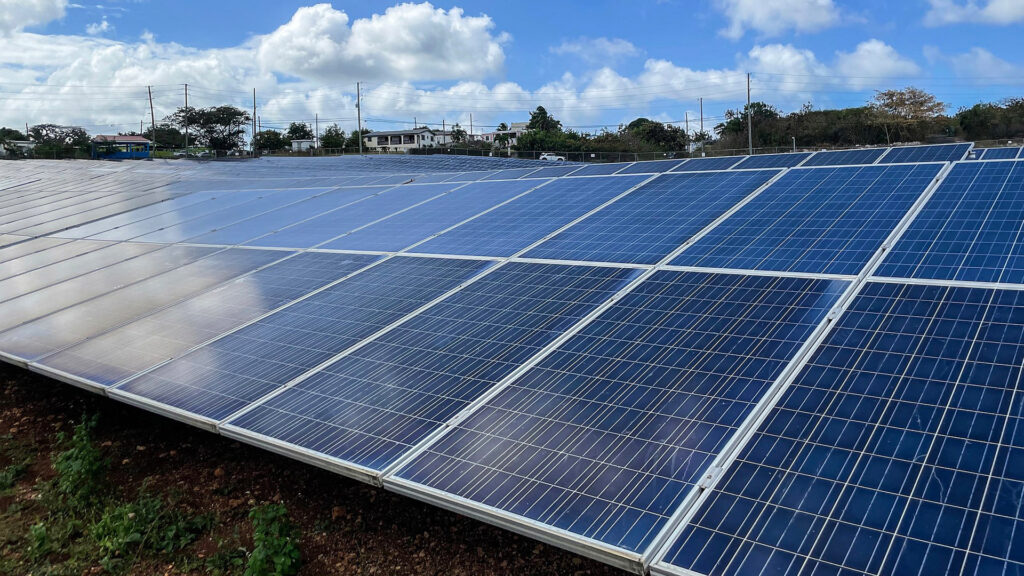By Peter Harding, Sierra Club’s Northeast Florida Group
As hurricanes Helene and Milton reminded us, utilities become top of mind during and after storms. That’s when damage and power outages make our energy vulnerabilities painfully clear. But even in calmer months, Jacksonville residents face a steady burden as utility bills continue to rise year-round.
This ongoing financial strain makes it vital to find long-term solutions that protect us from storm-related disruptions and offer consistent relief from the ever-increasing costs of energy.
JEA can shift toward clean energy that not only helps increase its resilience to future storms but also brings immediate financial relief by lowering energy costs and creating new local jobs. At the same time, they’re building a more resilient and sustainable future for Jacksonville.

The facility has already invested in multiple solar energy projects, but the reality is that our overall generation mix is still shockingly under-diversified. This lack of diverse sources makes it vulnerable to fluctuations in fuel costs.
Currently, JEA relies on burning imported coal and gas for most of our energy. Its long-term plan continues its dependence on burning fossil fuels by spending more than $1 billion on a new gas plant and extending the life of a tired coal plant.
Transitioning to clean energy sources isn’t just about environmental benefits — it can be a major driver of economic growth, resilience and high-quality, local jobs.
Jacksonville stands at a crossroads. By making smart investments in renewable energy, we can create thousands of well-paying jobs that can’t be outsourced, giving our local economy a much-needed boost. These jobs would come from industries that build, install and maintain renewable energy infrastructure, helping Jacksonville attract businesses focused on energy innovation.
In fact, the largest solar manufacturer in Florida is already based right here in Jacksonville and we have the potential to expand this thriving sector.
At the same time, JEA can capitalize on federal incentives designed to support the transition to cleaner energy. These incentives can help lower energy costs for Jacksonville families, putting more money back into their pockets. By investing in renewable energy now, we can also shield Jacksonville from volatile fossil fuel costs and set the stage for long-term financial stability.
Additionally, embracing clean energy would make Jacksonville more competitive and a magnet for innovation. Companies are increasingly drawn to cities that are serious about sustainability. By fostering a clean energy hub here, Jacksonville could attract top-tier businesses that generate economic growth, increase property values and create a thriving local economy.

The economic risks of clinging to fossil fuels are clear. Continuing to invest in coal and gas is a short-sighted approach that locks Jacksonville into higher energy costs and ongoing financial uncertainty. Instead, we should capture the opportunity to build a sustainable, prosperous future for our city — one that puts Jacksonville residents, their jobs and their financial security first.
The decisions we make today will determine whether Jacksonville becomes a leader in innovation or remains tethered to outdated, costly energy strategies.
Our city and its municipal utility, JEA, must take bold action now. With rising utility costs and an unstable energy market, it’s time to prioritize renewable energy. Investing in clean energy will lower bills, create local jobs and secure Jacksonville’s future. The time for decisive leadership is now, before we lock ourselves into an outdated, costly system.
Make your voice heard — reach out to city and JEA leaders today and urge them to commit to a clean energy future that benefits all of Jacksonville. For more information, visit RenewJax.org and learn how you can get involved.
Peter Harding is an executive committee member of the Sierra Club’s Northeast Florida Group. He lives in Jacksonville. This opinion piece was originally published by the Times-Union, which is a media partner of The Invading Sea. Banner image: A solar farm in Florida (ASCOM Prefeitura de Votuporanga, CC BY 2.0, via Wikimedia Commons).
Sign up for The Invading Sea newsletter by visiting here. To support The Invading Sea, click here to make a donation. If you are interested in submitting an opinion piece to The Invading Sea, email Editor Nathan Crabbe at ncrabbe@fau.edu.



